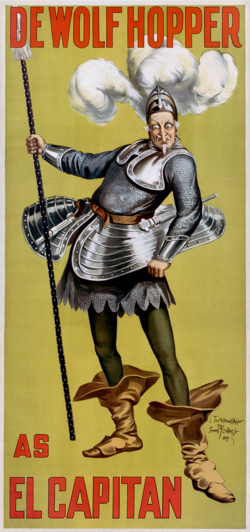
Sweethearts is an operetta or musical play in two acts with music by Victor Herbert, lyrics by Robert B. Smith and book by Harry B. Smith and Fred de Gresac.
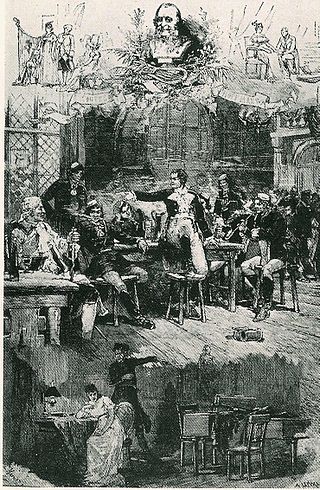
The Tales of Hoffmann is an opéra fantastique by Jacques Offenbach. The French libretto was written by Jules Barbier, based on three short stories by E. T. A. Hoffmann, who is the protagonist of the story. It was Offenbach's final work; he died in October 1880, four months before the premiere.
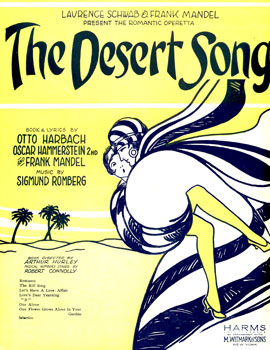
The Desert Song is an operetta with music by Sigmund Romberg and book and lyrics by Oscar Hammerstein II, Otto Harbach and Frank Mandel. It was inspired by the 1925 uprising of the Riffs, a group of Berber fighters, against French colonial rule in Morocco. It was also inspired by stories of Lawrence of Arabia aiding native guerrillas. Many tales romanticizing Saharan North Africa were in vogue, including Beau Geste and The Son of the Sheik.
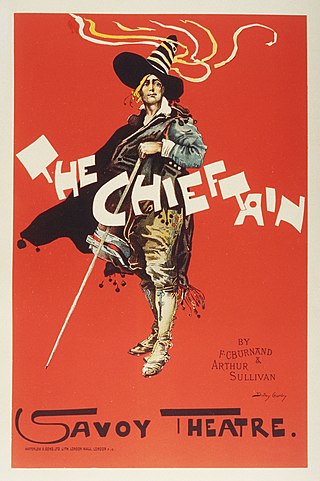
The Chieftain is a two-act comic opera by Arthur Sullivan and F. C. Burnand based on their 1867 opera, The Contrabandista. It consists of substantially the same first act as the 1867 work with a completely new second act. It premiered at the Savoy Theatre on December 12, 1894, under the management of Richard D'Oyly Carte, for a run of 97 performances.

Les Indes galantes is an opera by Jean-Philippe Rameau with a libretto by Louis Fuzelier. It takes the form of an opéra-ballet with a prologue and four entrées (acts). Following an allegorical prologue, the four entrées have distinct and separate plots, but are unified by the theme of love in exotic places. The most famous pieces from the work, Danse des Sauvages and the final Chaconne, come from the final entrée.

Askold's Grave is an opera in four acts by Alexey Verstovsky with a libretto by Mikhail Zagoskin.

The Emerald Isle; or, The Caves of Carrig-Cleena, is a two-act comic opera, with music by Arthur Sullivan and Edward German, and a libretto by Basil Hood. The plot concerns the efforts of an Irish patriot to resist the oppressive "re-education" programme of the English, which has robbed the Irish of their cultural heritage. A quirky "Professor of Elocution" who is hired by the English to continue this "re-education" of the Irish switches sides to help the Irish defend their culture. Romantic complications cause a confrontation between the Irish patriots and the superstitious English at the supposedly haunted caves of Carric-Cleena, and disguises are employed to hold the English off; but the professor ultimately comes up with a solution that works out happily for all.
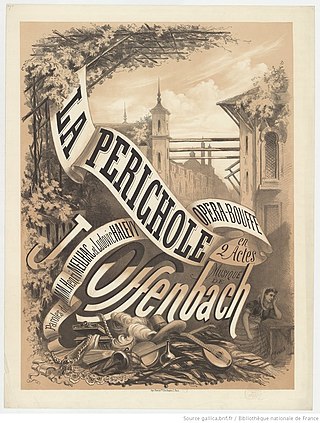
La Périchole is an opéra bouffe in three acts by Jacques Offenbach. Henri Meilhac and Ludovic Halévy wrote the French libretto based on the 1829 one act play Le carrosse du Saint-Sacrement by Prosper Mérimée, which was revived on 13 March 1850 at the Théâtre-Français. Offenbach was probably aware of this production, as he conducted the orchestra of the Comédie-Française from around this time. Another theatrical creation that pre-dates Offenbach's opéra bouffe and may have influenced the piece is a farce by Desforges and Théaulon given on 21 October 1835 at the Théâtre du Palais-Royal.

Tom Jones is a comic opera in three acts by Edward German founded upon Henry Fielding's 1749 novel, The History of Tom Jones, a Foundling, with a libretto by Robert Courtneidge and Alexander M. Thompson and lyrics by Charles H. Taylor.

The Serenade is an operetta with music and lyrics by Victor Herbert, and book by Harry B. Smith. Produced by a troupe called "The Bostonians", it premiered on Broadway on March 16, 1897 at the Knickerbocker Theatre and ran initially for 79 performances. It remained very popular into the new century, running almost continuously for the next seven years.

Madame Favart is an opéra comique, or operetta, in three acts by Jacques Offenbach. The French libretto was written by Alfred Duru and Henri Chivot.

Les brigands is an opéra bouffe, or operetta, by Jacques Offenbach to a French libretto by Henri Meilhac and Ludovic Halévy. Meilhac and Halévy's libretto lampoons both serious drama and opéra comique. The plot is cheerfully amoral in its presentation of theft as a basic principle of society rather than as an aberration. As Falsacappa, the brigand chieftain, notes: "Everybody steals according to their position in society." The piece premiered in Paris in 1869 and has received periodic revivals in France and elsewhere, both in French and in translation.
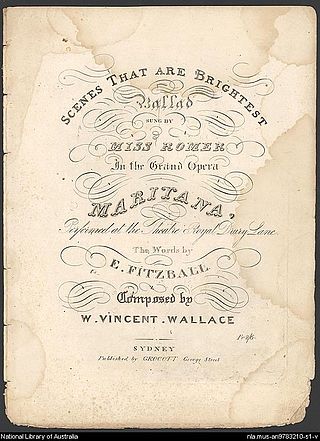
Maritana is a three-act opera including both spoken dialogue and some recitatives, composed by William Vincent Wallace, with a libretto by Edward Fitzball (1792–1873). The opera is based on the 1844 French play Don César de Bazan by Adolphe d'Ennery and Philippe François Pinel (Dumanoir), which was also the source material for Jules Massenet's opéra comique Don César de Bazan. The opera premiered at the Theatre Royal, Drury Lane on 15 November 1845.

Giroflé-Girofla is an opéra bouffe in three acts with music by Charles Lecocq. The French libretto was by Albert Vanloo and Eugène Leterrier. The story, set in 13th century Spain, concerns twin brides, one of whom is abducted by pirates. The other twin poses as both brides until the first is rescued. The composer chose an extravagantly far-fetched theme to contrast with his more realistic and romantic success La fille de Madame Angot premiered the previous year.
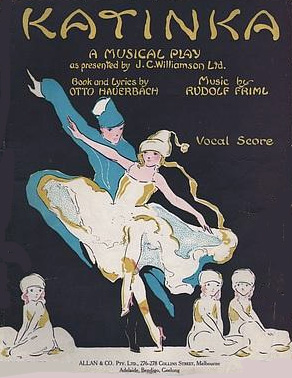
Katinka is an operetta in three acts composed by Rudolf Friml to a libretto by Otto Harbach. It was first performed at the Park Theatre in Morristown, New Jersey, on December 2, 1915, with May Naudain in the title role and subsequently received its Broadway premiere on December 23, 1915 at the 44th Street Theatre.

Alfred Asher Klein was an English-born stage actor, singer and comedian who appeared in operettas and musical theatre in America in the late 19th century.
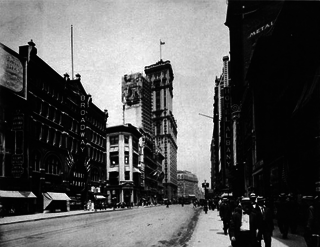
The Broadway Theatre near 41st Street was a Manhattan theatre in operation from 1888 to 1929. It was located at 1445 Broadway.

The Charlatan is an 1898 American operetta also known as The Mystical Miss, with music and lyrics by John Philip Sousa. Today only excerpts from the work—"The Charlatan March", "The Charlatan Waltzes" and "The Charlatan Overture"—are commonly known. The operetta is set in the early nineteenth century in Russia with scenes in the village of Bohkara; at Gogol's house; and in the Grand Duke's Palace in Russia.

Le cœur et la main is a three-act opéra comique with music by Charles Lecocq and words by Charles Nuitter and Alexandre Beaume. It was first performed on 19 October 1882 at the Théâtre de Nouveautés, Paris.
